 The lack of major defections from Venezuela’s armed forces reflects both the power and the perversion of their anti-imperial, developmental, and pro-social role under Hugo Chávez, writes Asa Cusack (LSE Latin America and Caribbean Centre).
The lack of major defections from Venezuela’s armed forces reflects both the power and the perversion of their anti-imperial, developmental, and pro-social role under Hugo Chávez, writes Asa Cusack (LSE Latin America and Caribbean Centre).
n.b. republished courtesy of Al Jazeera; Creative Commons licence does not apply
One month on from Juan Guaidó’s decision to declare himself acting president of Venezuela in parallel to President Nicolás Maduro, the country remains in a strange and dangerous limbo.
Guaidó has unified an opposition prone to fragmentation, received recognition from scores of foreign countries, and gained the support of various international institutions. But despite his offer of an amnesty for military personnel transferring their allegiance to his presidency, only a handful of Venezuela’s thousands of generals have made the switch. Even a major standoff over allowing US aid into the country on February 23 saw only a small number of defections by low-ranking officials.
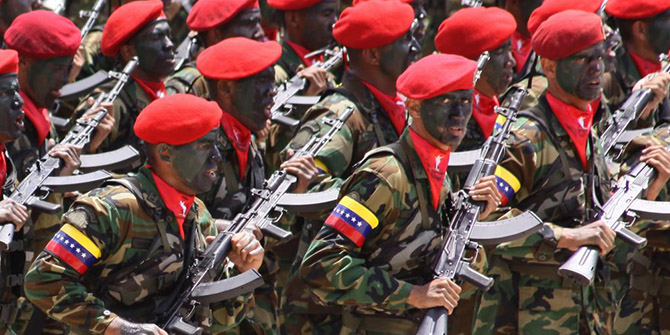
So what went wrong? In short, Guaidó’s plan to remove Maduro with military help was undermined by his misjudgment of military perceptions of the opposition and the resilience of Venezuela’s decades-old civil-military alliance. But this should not be seen as bad news. Military action of any kind, internal or external, would be fraught with danger in Venezuela’s volatile situation. A negotiated transition towards free elections offers a far better way forward.
Rolling the dice on military mutiny
Guaidó’s first gamble, when declaring himself president on January 23, was that members of the military high command were simply waiting for an opportunity to overthrow Maduro. But the intoxicating mix of newfound unity and foreign support proved misleading, and there were no significant defections.
A month later, Guaidó and the Trump administration orchestrated a standoff at Venezuela’s borders over the entry of humanitarian aid, hoping that military officials would refuse to be directly and publicly complicit in the suffering of their countrymen by blocking aid at the border.
But the assumption that moral pressure and declarations of a possible amnesty would be enough again proved misguided.
The power of Venezuela’s civil-military alliance
The backdrop to any discussion of the Venezuelan military must be its politicisation long before and during the presidency of Hugo Chávez.
Although Chávez is often depicted as having burst on to the public stage out of nowhere, he founded the Revolutionary Bolivarian Movement-200 within the military in 1982, some 16 years before his election win in 1998.
By 1992, the movement had grown strong enough to launch a viable coup attempt against President Carlos Andrés Pérez, ultimately landing Chávez in jail and sowing the seeds of the popular support that would later win him the presidency.
In office, Chávez developed this movement into a broader civil-military alliance that emphasised social responsibility, participation in national development, and anti-imperialism.
Today these three pillars of the civil-military alliance play contradictory roles in the ongoing crisis.
Anti-imperialism and the old enemy
Given that their core function is to protect the homeland from foreign invaders, armed forces everywhere already have a natural inclination towards nationalism, but a Bolivarian ideology centred on escaping the oppressor’s yoke only reinforced this tendency in Venezuela. And while for Latin American independence hero Simon Bolivar the oppressor was Spain, by the end of the 20th century the United States had come to occupy this role.
This in itself makes the US sponsorship of Guaidó’s bid to unseat Maduro extremely hard to swallow for the military. More fuel was added to the fire by National Security Adviser John Bolton admitting that Venezuelan oil is a motivating factor for US involvement and by Trump assigning the Venezuela portfolio to Elliott Abrams, best known for his role in covering up gruesome atrocities and illegally channeling funds to murderous paramilitary armies in Central America in the 1980s.
Economic and existential threats to the top brass
Participation in national development also meant that over time – and especially as Chávez gradually lost trust in other actors – the military began to play a greater role in the national economy, both licit and illicit.
For those at the top of the tree, privileged and poorly controlled access to anything carrying a state subsidy – most notably food, oil, and dollars – enabled different forms of speculation. Cheap food and oil could be smuggled into Colombia, Brazil, and the Caribbean and sold at a huge mark-up.
Demand for dollars combined with capital controls created a black market whose exchange rate soon soared above the fixed official rate, allowing cheap state dollars to be recycled through the two markets, the difference in prices passing from state coffers into private hands. Control over borders and remote areas of the national territory also facilitated involvement in drug trafficking.
US sanctions against the top brass involved in these activities have proved counterproductive, effectively linking their fate to that of Maduro. His downfall could see them held to account by an incoming opposition government or extradited to the US to face prosecution.
Although Guaidó has proposed an amnesty for military figures who switch sides, this strategy has been gravely undermined by his US allies. John Bolton, for instance, warned that Maduro could yet end up in Guantanamo, whereas “follower of Christ” Senator Marco Rubio hinted at his fate by tweeting images of the brutal lynching of Libya’s late leader Muammar Gaddafi.
And while the dulcet tones of the fresh-faced Guaidó may soothe the souls of foreign diplomats, politicians, and correspondents, Venezuela’s domestic reality is a world apart from its representation abroad. The parts of the military that really matter understand well that behind Guaidó’s wholesome image lie many of the most radical leaders of the past two decades.
These include his mentor, Leopoldo Lopez, who was the key figure behind the “salida” (exit) strategy that sought to bring down Maduro by any means necessary in 2014, and others such as Antonio Ledezma and Maria Corina Machado, who have explicitly invited foreign military intervention.
For years, this wing of the opposition has been speaking softly abroad while carrying a big stick at home. The armed forces naturally fear that the big stick has not gone away, even as Guaidó stretches out a hand of forgiveness and reconciliation.
The dilemma of the Venezuelan soldier
The flipside to all of this is the social aspect of the civil-military doctrine. The bulk of any military force tends to come from the lower social classes, which in itself should favour empathy for the lot of those same segments of the population. But the civil-military alliance further reinforced this, directly involving the armed forces in the delivery of social projects “to create closer bonds of trust, cooperation, and mutual identification between the civilian population and the military”.
The social crisis has reached such proportions – with food shortages, disintegration of the health system, rampant crime, and mass migration – that no soldier can remain untouched by its grim consequences. There are undoubtedly many within the armed forces who are deeply troubled and angry about the devastating effects of the Maduro government’s policies on those very people that the Bolivarian movement was designed to help, but the lower ranks face even stronger disincentives to defect than their commanding officers.
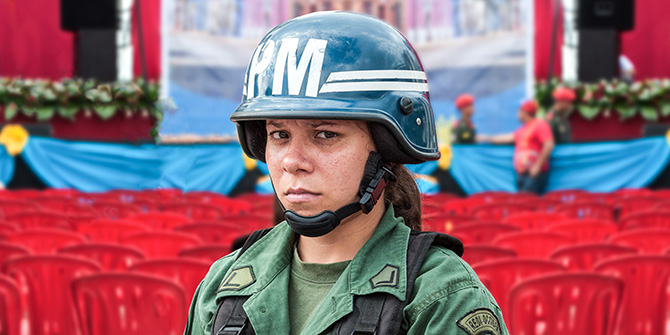
No salary can compete with Venezuela’s runaway inflation, but in the military more than elsewhere Maduro has tried to maintain a modicum of purchasing power. Closeness to the state also confers better access to subsidised goods and public services for security forces and their families. Though nowhere near sufficient in themselves, these small advantages make all the difference in Venezuela’s precarious situation. The alternative of defection also presents immense risks, particularly in terms of retribution against soldiers and their families.
The painful effects of the cruel personal dilemma for soldiers were in evidence during the aid standoff on Venezuela’s borders on February 23. Some security personnel blocking the Colombian border wept as protesters urged them to defect. Others bolted across the border on foot, their gravest fear clearly that they would be caught within Venezuela and have to suffer the consequences.
Overall, these severe personal concerns quite naturally outweigh any broader social ones. Only if significant sections of the military could together coordinate a turn against Maduro would the possibility of a successful rebellion begin to alter this cost-benefit calculation. By their very nature, however, these middle and lower ranks lack the power to command whole divisions into decisive action.
Moving beyond military solutions
The current lack of appetite for military intervention, internal or external, is not bad news. Venezuela’s territory already plays host to a vast array of armed groups – the Colombian National Liberation Army (ELN) fighters, drug runners, wildcat mining gangs, pro-government militias – and the addition of internal pro- and anti-Guaidó military factions or external armies could easily detonate this powder keg.
The alternative to an amnesty plus internal military intervention is an amnesty with internationally mediated negotiation. Negotiation and amnesty for Maduro and his inner circle may be unjust, immoral, and unpleasant given the grave crimes committed. But even if it feels “like swallowing a toad“, veteran Venezuelan pollster Luis Vicente Leon is right in saying that it’s better to be Spain, Chile, or South Africa with an amnesty than Syria, Libya, or Iran without.
Avoiding a direct US role and replacing it with support from a less confrontational group of international partners could really help to resolve Venezuela’s crisis.
The International Contact Group (ICG) initiative does exactly that. Its European members were far slower to recognise Guaidó than the US and do not have the same toxic reputation for interventionism. And unlike the largely right-wing Lima Group that has backed Guaidó, the ICG’s Costa Rica, Uruguay, and Ecuador are governed by parties of the centre-left. Rather than pressuring the Venezuelan military to turn on Maduro, the ICG is focused on finding “a political solution to a political problem”, but always with the clear goal of moving towards free elections.
Although the US cannot play a direct role in this initiative, it could offer selective loosening of its powerful sanctions on oil and financial transactions in exchange for reforms vital to new elections, not least appointment of a new electoral council and acceptance of international election observation.
While this may not be the route that Guaidó and his backers had in mind, it is the ICG rather than the military that now offers the best chance of re-establishing legitimate government in Venezuela.
Notes:
• The views expressed here are of the authors rather than the Centre or LSE
• Originally published by Al Jazeera and republished with their permission; Creative Commons does not apply
• Please read our Comments Policy before commenting



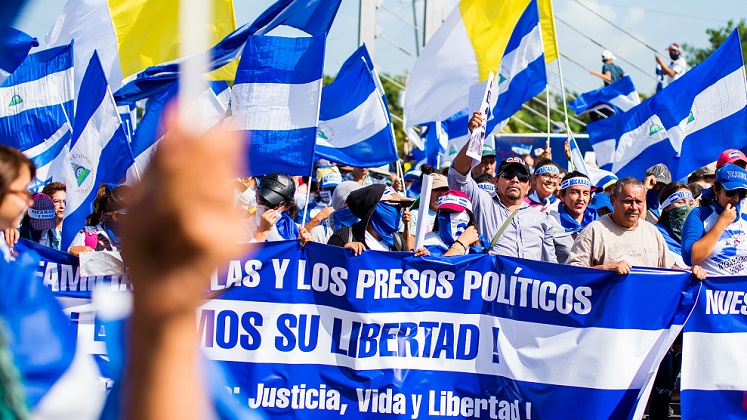
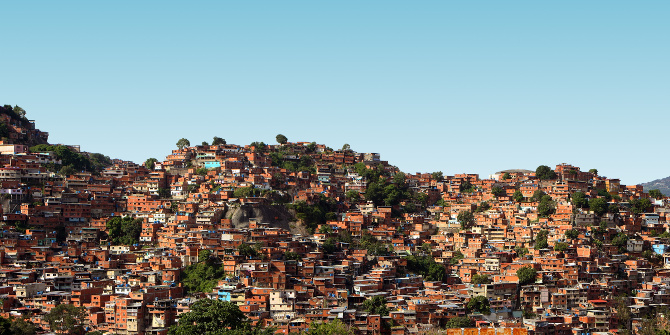
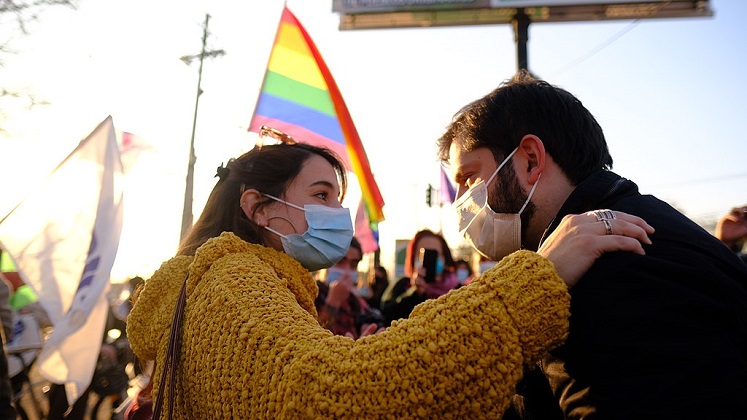
You mention that the ‘thousands of generals’ in the military have been involved in drug trafficking and the black-market currency trade. Who are they? Please name names.Otherwise it is just yet another unsubstantiated claim. Besides, drug trafficking is not exactly high on the list of Venezuela’s woes at present (if at all). If you want to see real corruption look back to the 1970s and Venezuela Saudita when today’s opposition was in power with capital flight, rent seeking, nationalisation of private debt, rotten banks which collapsed in the 1990s bank crisis etc.
You have ‘forgotten’ to mention that during the Caracazo the military were told to turn their guns on their own people to put down the rioting by the same political class, and the Accion Democratica party then in power and now part of today’s opposition. That led to the rise of Chavez and his colleagues who railed against that command.
Luis Vicente Leon is opposition linked and his polls have been roundly dismissed for years as being unrepresentative. He is not someone who should be cited by anyone claiming a neutral stance (if you even bother to do that).
By mentioning the ICG as a solution you ignore the fact that there were elections just last may which Maduro won and which the opposition mainly boycotted, of their own volition, as they have several times in the past. There is no need for further elections and the ruse the US uses to justify regime change (that there is a constitutional excuse for recognising Guaido, is complete nonsense. You also do not mention all the countries involved in the ICG, just those you think appear ‘harmless’ and benign.
European countries no ‘toxic record of interventionism’. Are you serious? British Guiana still important in Venezuela because of the Essequibo issue still unresolved, Malvinas/Falklands, Spanish conquest, Portuguese conquest, French Guiana, Dutch Guiana (Suriname) and the British, Dutch and French islands in the Caribbean.
You once again mention emigration as a big problem for Venezuela. But in a country with few jobs due mainly to US sanctions, surely return emigration, especially of people who were immigrants themselves from Peru, Ecuador and Colombia, should be seen as a good thing? The OAS is actually asking countries to recognise out-of-date travel documents (ie expired passports from their country of origin) to help settle those people.
.
“thousands of generals” and drug trafficking are apart in the article, so I’m not sure why you unite them. One is a matter of fact so I don’t understand the quotation marks, and the other is already linked to an article from a well-regarded source that names names.
I agree that drug trafficking is not at the top of Venezuela’s long list of woes, but it is relevant here because it’s part of the reason why generals could fear prosecution or extradition. I’m sure drug trafficking also involves a lot of woe for a lot of people, even if it’s not visible and might be worse if tackled via a “drug war” as in Mexico.
I’m well aware there was corruption before Chavismo. If you read things I’ve written before, I’m much more likely to talk about continuities than most people are. It’s not here because it’s not especially relevant.
I am also well aware that the Caracazo was a degree of repression that Maduro hasn’t resorted to (although the Operaciones de Liberación del Pueblo by the FAES do appear to involve fairly indiscriminate killing, albeit of supposed, but untried, criminals). I do agree with your implication that this past (like the past in general) is often overlooked, and I find the misrepresentation of repression problematic — frequent use of “bullets” for what are actually rubber bullets being one example off the top of my head — just as I find misrepresentation to be a problem all round. It feeds the feverish confusion, distrust, and polarisation that underlies everything else.
Leon is open about his sympathies for the opposition, which is far more honest than most pollsters in Venezuela have been. Datanalisis is about as reliable as they get in Venezuela, and it frequently reports findings that do not favour the opposition. Hinterlaces was also good, but Oscar Schemel’s entry into the constituent assembly has tainted it somewhat.
I don’t ignore the previous elections, but they were far too flawed to be reliable. Whatever you think of Leopoldo Lopez or Henrique Capriles, they are undoubtedly serious candidates, so to have them barred from running makes the election fundamentally unreliable. And that’s putting aside the blocking of the recall referendum (an option available only because of Chavez’s 1999 constitution) and the creation of a constituent assembly that no one asked for (unlike in 1999) and that appears not to be performing the role for which it was designed (writing a new constitution) but rather just making the most of its sweeping powers to legislate in place of the legitimately elected congress that is dominated by the opposition. Because the 2015 legislative elections were accepted by all sides, it is obviously not a “complete nonsense” to say that the Guaido move lacks any coherence. I do find attempts to claim it is 100% constitutionally sound a little bit hopeful and unnecessarily so, but the basic logic is sound.
I mention only the Latin American countries of the ICG because it’s a contrast with the right-wing Lima Group. Likewise I am saying that EU involvement in the ICG is less toxic than US involvement, because the incidents you mention — though real and serious — are dwarfed by the consistent and consistently devastating invasions and intrigues of the US.
As in a previous comment, I find your interpretation of migration somewhat disturbing. If people are not moving by choice but as a reaction to awful conditions, how could it be a good thing? The OAS is seeking to recognise out-of-date documents because people have neither the money nor the patience to extract them from an incompetent and obstructive state yet they find themselves obliged to travel to other countries.
Surely your energy would be better expended on criticising people who really are heinously misrepresenting things in Venezuela, of which there are plenty, no? But I would recommend doing so not by misrepresenting in the opposite direction, which is also a common response where Venezuela is concerned.
[nb. I removed a sentence about nativist ideas of migration from my original comment because I think my reaction stemmed back to a previous comment of yours on another Venezuela post, so this was probably the wrong place for it as the comments are unconnected for the general reader.]